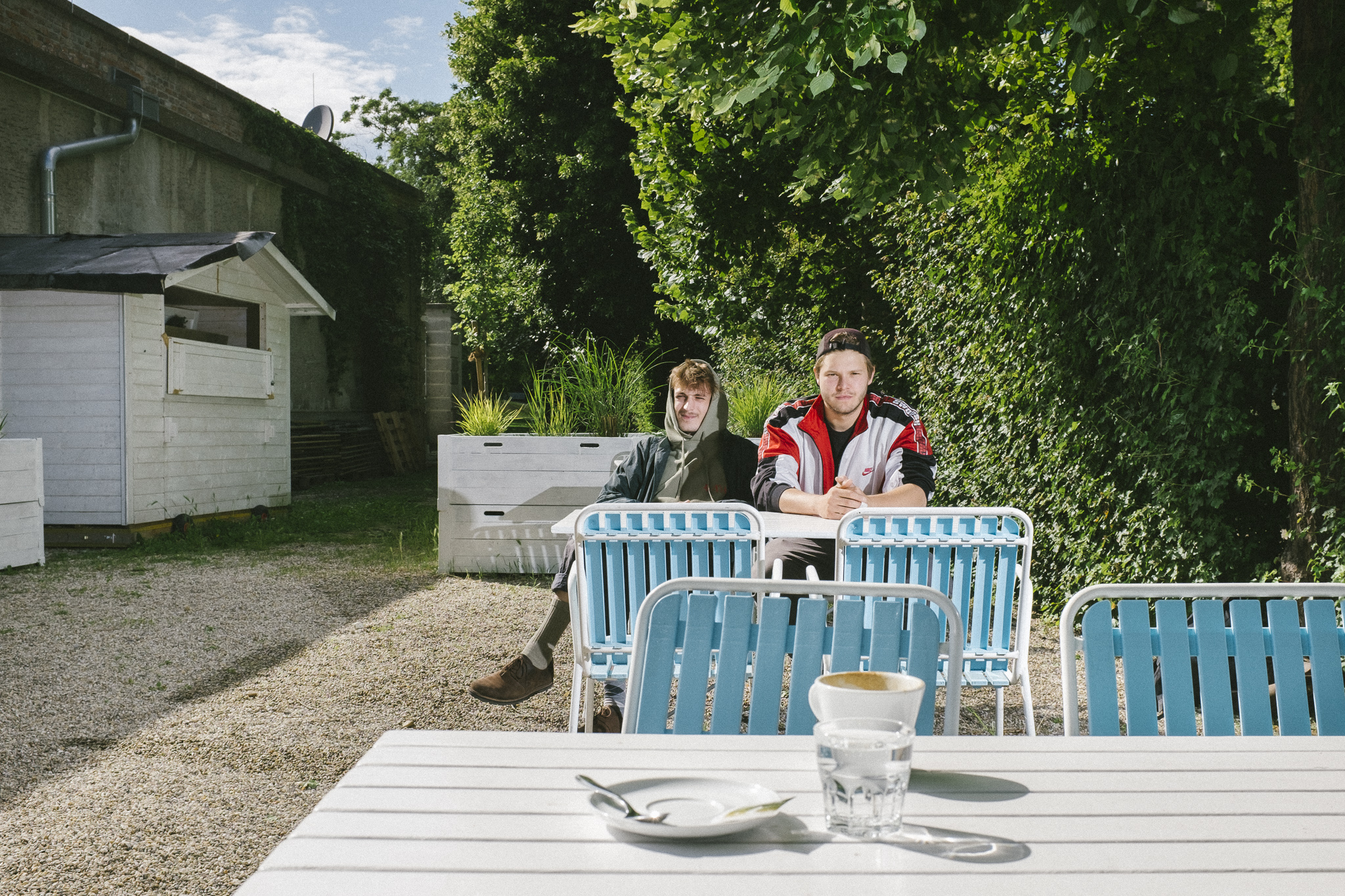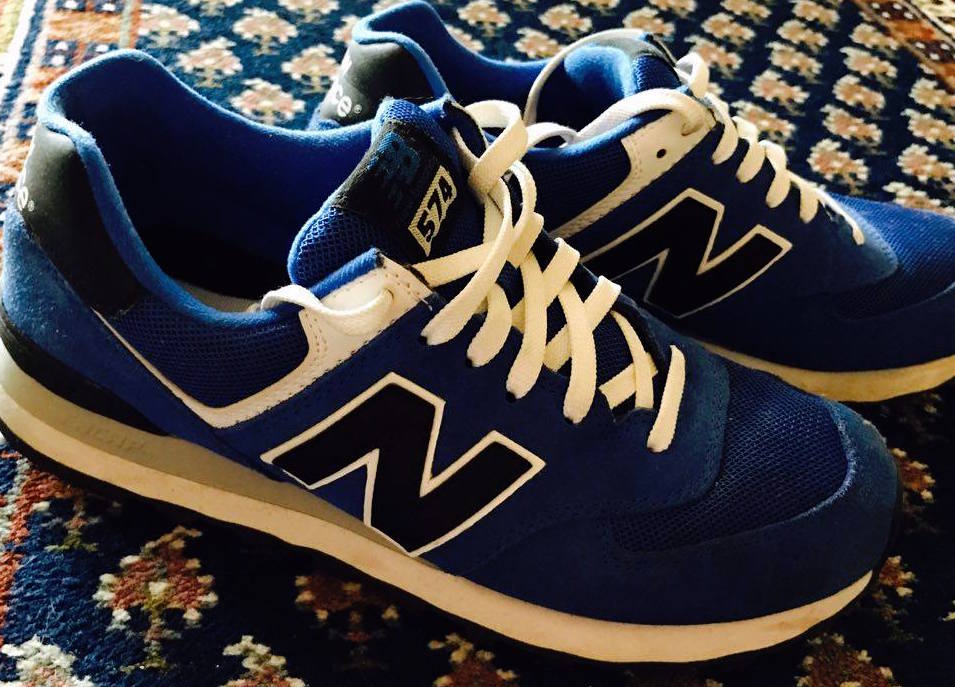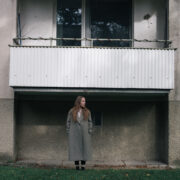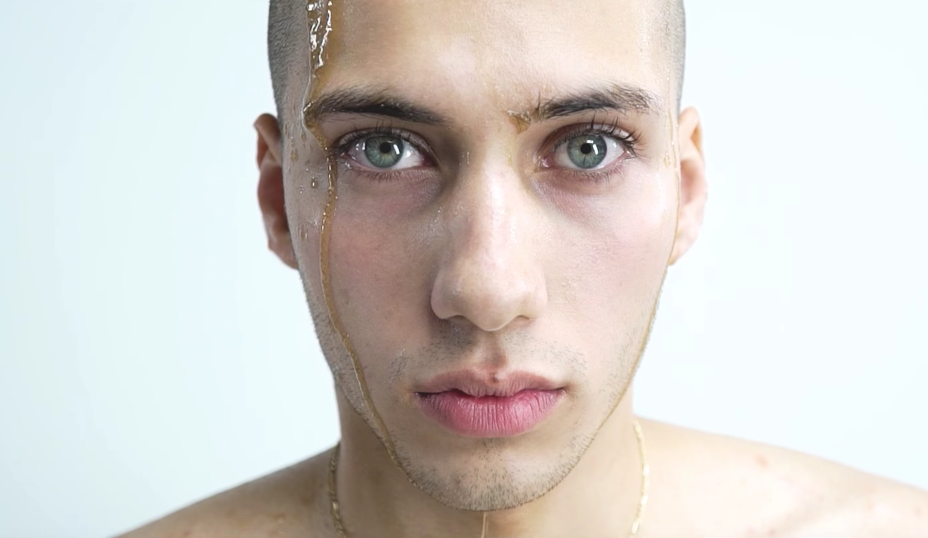1/3 Instrumentals, 1/3 Underground-Deutschrap, 1/3 Emotrap, wo hoid jemand bissi…
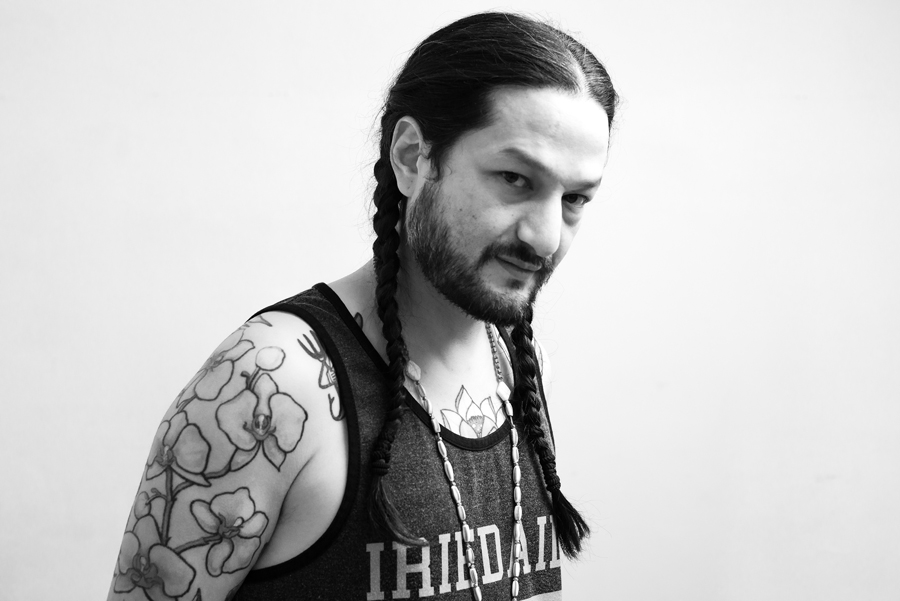
DJ Werd ist seit Jahren eine Art „graue Eminenz“ im deutschen HipHop-Geschehen. Aufgewachsen in San Jose, Kalifornien, wo er Mitte der 90er-Jahre auch seine aktive DJ-Karriere begann, ist er um die Jahrtausendwende nach Berlin gezogen, hat als Teil der legendären Turntablist-Crew Phaderheadz schnell Anschluss gefunden und war als Live-DJ von Sido & B-Tight ein wichtiger Wegbereiter für den Aufstieg von Aggro Berlin. Heute führt er sein eigenes Label namens Long Lost Relative, pflegt bis heute seine österreichischen Kontakte zu unter anderem Duzz Down San und verdient seinen Lebensunterhalt als Musiker bei der Casting-Show „The Voice of Germany“. Trotz unzähliger Liveauftritte und Projekte mit anderen Künstlern veröffentlichte er erst kürzlich sein erstes Soloalbum „The Path„, dass er anlässlich des fünfjährigen Bestehens von Fear Le Funk in Kooperation mit der diesjährigen Viennale Ende Oktober dem Wiener Publikum als einem der ersten überhaupt live präsentierte. Im Interview sprechen wir unter anderem über seine Anfangszeit, den Wandel der Turntablism-Szene, „The Voice of Germany“ und natürlich sein erstes Soloalbum.
Interview: Daniel Shaked & Simon Huber
Fotos: Daniel Shaked
The Message: This must feel like „coming home“ for you, right? You lived in Vienna a couple of years ago. Did you connect with all the Austrian people you work with during this time?
DJ Werd: I actually only lived here for about a month or something, when I had the „Artist in Residency“. A month isn’t that long actually, but it was good times. I knew most of them before, except for the younger guys – nice to meet you by the way. There were people like Zuzee from the Waxolutionists or the Supercity Soundsystem. I knew him through the whole turntablist-scene and the Phaderheadz in Berlin. He first wrote to me to sell my mixtapes and I was really happy to meet him at one of those Supercity Soundsystem parties. It was the release party of Total Chaos and the Waxos at WUK. It was a big event. And a long time ago. I opened that party together with Sepalot.
You grew up in the United States. What was the actual reason for you to move to Berlin?
I didn’t really plan it. At first I thought I’ll stay there for half a year or a year to just kinda hang out for a while and go back home after. But DJing in Berlin was the shit in the late 90s! I didn’t see parties like this before in California. In California we have this law, you can’t sell liquor after 2am so all the clubs are done after 2 o’clock in the morning. They had like four DJs between 10pm and 2am and one hour for one DJ isn’t that long actually. In Berlin I saw parties going from 10pm to 8 the next morning and I really liked that. A lot of things in Berlin were more comfortable for me, you never have problems with the police or something if you just mind your own business. In California you have problems if you are just at the wrong place at the wrong time. So I stayed longer and longer in the city… now it’s about 16 years later. But I never really meant to stay in Berlin till I’m old.
How long did you do it legally? I guess it’s not that easy as a US citizen.
I guess it’s getting harder and harder. Back in the day, in the late 90s, it must have been a little easier than it is now to get a visa as an artist. Back then the label Aggro Berlin helped me to stay and wrote a letter saying I was actually making money and they need my skills in order to get their business running.
This was around 2000, when Aggro Berlin was quite small. Who did you meet first?
It had really just started. I met Sido and B-Tight selling tapes outside of the hip-hop shows. It was really natural, they just did the same I was doing. We hung out, smoked weed together and got along very well. In the beginning I was booked more often than they were and I had to put them on the guest list. I didn’t really understand what they said in their music, we were friends and I was their DJ for their first shows… and now it’s payback time! (laughs)
But this is, how it works, when you want to build up a camp, right?
Yeah, it was really organic. I was always doing my own music which is different from theirs and that’s why we are still working together, it was always very balanced, because I didn’t put too much of my ego into their career. I was just doing my job while I always had a kind of emotional distance to it. I see a lot of people DJing for different rappers in Germany that really are like hardcore into it, but usually it doesn’t last that long. Just for a few years and then things fall apart, because they identify too much with the people they work with. I never wanted to do that – maybe that’s the reason why we still work together. Because we make different kinds of music.
But now you actually understand the music?
Yeah… and their music’s got better over the years, too. (laughs)
Due to your feedback?
It could be, I mean we talk about things. Since the beginning we’ve had lots of deep conversations late at night. We have a lot of different opinions, so I hope that some of my opinions have gotten into their subconscious and at least helped them to get in a certain direction which is a bit more conscious.
So you really got an inside view of when Aggro Berlin was built up. Or did you only get booked for the live shows?
Well the live shows, that was our thing and it still is. We are free to do whatever we want, I always had an influence there and the way we play a hip hop show is influenced by how I grew up with hip hop shows. But you can see it at the festivals – hip hop changed a lot since the 90s and there are not a lot of people doing this kind of solid hip hop show like it used to be. Times have changed, the music has changed a lot, the idea of live shows has changed, but the whole hip hop idea still works today. If you do well, people will recognize it and you get respect for what you are doing. That’s something special about hip hop I think. There’s communication all over the world through this genre of music and if you are good at it and you are paying your dues and practice a lot the people will recognize it.
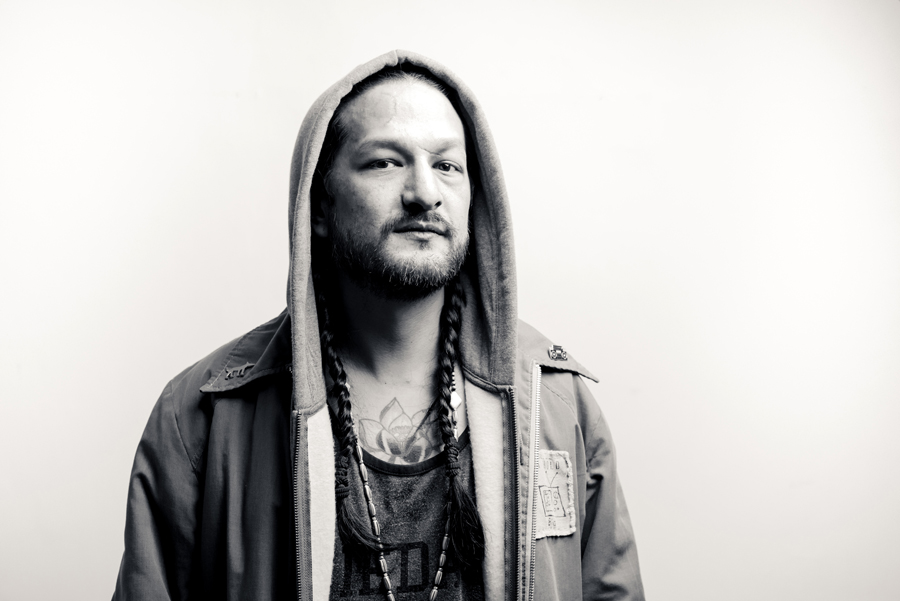
What about the Phaderheadz?
The turntabalsim scene kinda fell apart at some point. The Phaderheadz were very turntablism-focused, a lot of them are still scratching and making music, but at the moment there is not much attention on the turntablism scene like it used to be. And like the dudes who are very nerdy and really about the technical side of turntablism got a bit lost with the new generation of self-promotion. A lot of people were really technically good, but not good at promoting themselves.
And also with technical innovations like Serato a lot of people started calling themselves DJs.
Yeah, that has changed what a DJ is for sure, but there’s still a scene of turntablists out there. It’s just a small scene with mostly older people. I don’t see a lot of young kids really getting evolved in the technical side of turntablism anymore. It’s funny, I thought there would be at least a few, but it seems like it’s mostly for people my age. But it’s alright, you gotta move with the technology a little bit. I’m looking at kids doing incredible sets with MPCs or Ableton, it’s really interesting. There’s still some interesting stuff going on, it just might not be the same skill set as 10 or 15 years ago.
You had the Phaderheadz and the Aggro Berlin thing at the same time. When did you come up with the Long Lost Relative?
The Long Lost Relative project was important for me to make my own music in this whole world of anyone else’s music in Germany. I did a lot of Aggro Berlin shows and Sido shows, the Phaderheadz were battling, but I grew up with a certain specific style of music and Long Lost Relative back then was first to be able to produce that. It’s changed a lot, too, because everybody is moving in their own directions, but we still make music and now it has become this collective which probably fits our whole vibe better, the idea that we are like one group. Everyone is creative in the whole group.
When you say you grew up with a certain style of music, what are you refering to?
For me it’s like the DJ Krush or DJ Shadow stuff that was happening, Mo‘ Wax. This kind of music really influenced me when I started DJing with around 17 or 18. Also the Kruder & Dorfmeister stuff. I heard it in America before I ever had been in Europe and back then I was thinking like: ‚Wow, European hip hop is dope!‘ I came to Berlin and thought everybody will make such dope ass shit like Kruder & Dorfmeister, but it wasn’t really like that. It always looks different from far away. In the US we had Portishead, Dr. Octagon or DJ Shadow and we saw the European parallel to them in Kruder & Dorfmeister at the time, but everything went into different directions after that. And I think when you are sitting in the middle it looks a lot different. But you still had a lot of people like the Waxolutionists making really dope hip hop beat stuff, instrumental stuff and turntablism. It was like a certain generation of people making dope music, but a lot of the scene has changed.
There was a certain hype for instrumental hip-hop at that time we were talking about. Then it cut down, but I think it’s coming back again. And the response is great, there is a lot of output all over the world. It kinda restarted in Europe with the Hi-Hat-Club projects and e.g. producers like Dexter, Brenk or Suff Daddy.
Yeah, maybe this was a kind of rebirth of the instrumental scene. And I think it’s hard for German-speaking rappers to get recognized in other regions. But a beat maker in Germany can have the same relevance in Japan as a Japanese beat maker, there are more opportunities to be international.
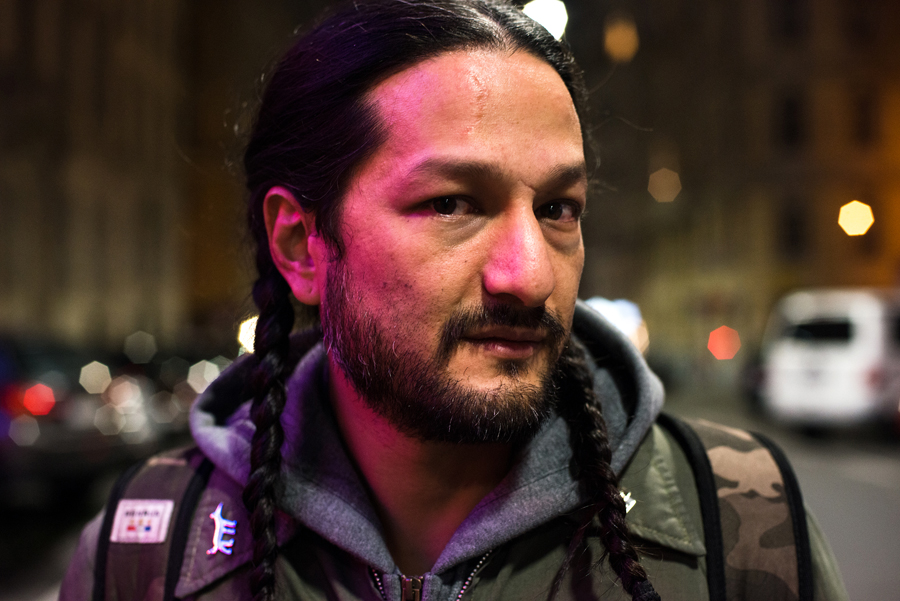
You are one of the few personalities in the German hip-hop scene who really sees certain things as a job. So you have the Sido shows and Long Lost Relative on one hand and your job on „The Voice of Germany“ on the other side. Is it hard for you to separate?
Not really. I think that a lot of people who are making similar music also have some kind of separation between their music and their job. The only difference is that the job might not always have something to do with music. Some guys are like computer programmers or something and do their music on the side. I feel really lucky to be able to work with music, even if it’s not necessarily the kind of music I’d be making myself. But I’ve also learned I lot that I can use for my own music and it’s really been a blessing. There was times when I thought that my music was supposed to be the thing that supported me and I think that was just setting me up to be rather disappointed in the whole music industry, in the small scenes. If you have too much expectations of something should support you, it’s really hard to appreciate it for what it is. That was an important step for me to be able to really work professionally with music and have the pressure lifted from my own music. So I can make music that I don’t really care about, if people like it or not. It becomes more like honest self-expression than if I’m thinking about what people really want. That has been a really good thing for me and it lets me make the music I actually want to make. It’s not gonna be easily digested, it’s no music for the clubs or the radios. It’s pretty specific, slow music. There’s not much room in the commercial world for slow music. But I feel like people are getting more open for slow music due to the development in the trap and electronic scene. I was playing at the Beatgeeks Night last Tuesday in Berlin and I noticed I can play my BPM and people were dancing to it. A few years ago I couldn’t even think about playing such slow songs and people being excited and moved. Maybe people are becoming more open about new sounds, new experiences and I give that a lot of credit.
Do you think this comes with a certain age, too?
The young people are the ones to get into the slow BPMs right now, that’s what I noticed. Even if you listen to Solange’s album – it’s super slow, the BPM is slow, the production is very interesting, it has its own characteristics. I feel like the newer generation of music listeners are – like it’s always been – looking for the opposite of what the old generation had, they want their own thing. Through a lot of this trap stuff the whole thing kind of slowed down. The young rappers these days – I’m thinking about the Mick Jenkins album or even the album of Kendrick Lamar – have a lot of slow, jazzy, melodic stuff that wouldn’t have been there a few years ago. It’s exciting to see where that leads to. I’m always looking forward to what the younger generation is coming up with because it’s getting boring recycling old ideas and there’s a tendency for older people to think that the past was better than the present. But I think, when I was younger a lot of people my age were searching for more good music. Nowadays people just take what’s given and that’s never been the way to find good music. You really have to dig deep and nowadays with the internet it’s possible to dig really deep… or also to stay on the surface. A lot of people just check their Facebook feed and that’s what they think all the music is that exists. It depends on what you want for yourself. But I think it’s important to remember that hip hop is a culture of digging, of looking through the records and find the stuff that fits to you and that you like the most.
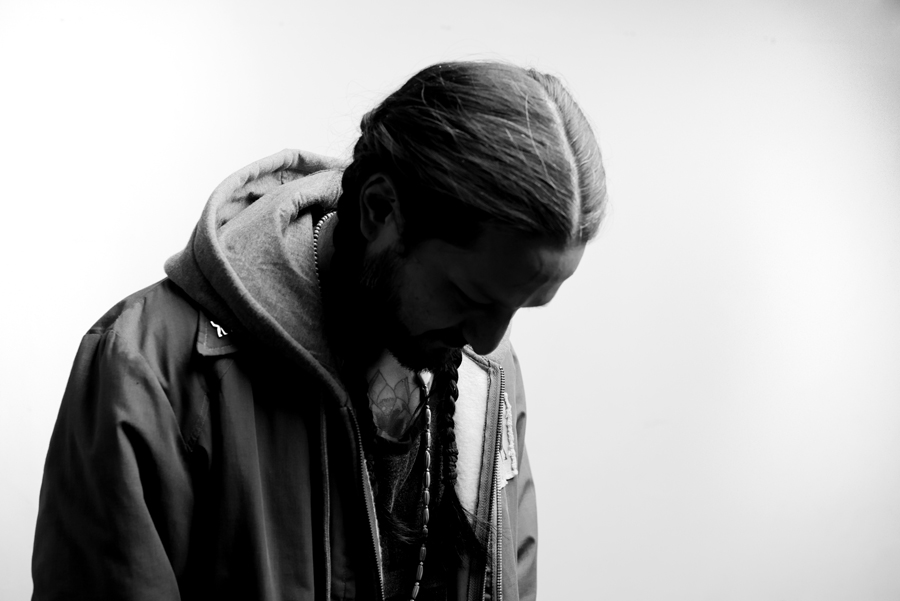
What kind of music would you go for, when you dig?
I’ve always been excited for rap music, this is what I’m trying to keep up for a life time. I’m always looking for new, young rappers and recently it has been a few people that I found. I’m also super into that BADBADNOTGOOD stuff lately. They are working with dope rappers, it’s super interesting, especially the tracks on the new Mick Jenkins album, I really like this style. I also have to say that what Kendrick Lamar has been doing the last few years opened a lot of doors for underground artists. In California I also feel like the taste got much better, at least much more serious, musical and contentwise.
Would that be something you pass on to your people in Germany? When we talk about people you guided along their way the last couple years…
For sure, I’m always playing music, even if I’m just hanging out with friends backstage before concerts and shows. We are listening to music the whole time, so I play the stuff I feel is dope and I’m always open to hear what the other people in the crew are listening to, especially when younger people show me their stuff.
To come back to your work on „The Voice of Germany“: What exactly is your job there?
My job title is „DJ, Percussionist & Operator“. That actually means I create the Ableton sets for the live shows for example.
Do you really think shows like „The Voice of Germany“ are able to bring up new good artists?
I have to be careful with this one… (laughs) This show in particular is really good. For me and the other people in the band it’s a job. As musicians it’s really high level recording and performing, all the members of the band are top musicians in Germany and being surrounded by them also pushes me to get better because there’s no time and space for any mistakes. The job also gives me the opportunity to run my own label, it wouldn’t be possible without the money I earn with „The Voice“. I feel like the people who actually compete on this show have the chance to get attention, but if you think about the concept of these television shows it’s not really necessarily to find the best artist and to create a career for them. The point of the show is really to entertain people on television so the show can go on the next year.
Do you think it’s realistic for you to live from your own music at some point? And do you even want this to happen?
I have mixed feelings about that. On one side I would love to be booked for the music I make and be able to do what I want. I’ve seen DJ Krush a few times in Berlin and I like the fact that he can show up and play whatever he wants to and what he thinks is the best for the party and the people are with him. I always thought that’s a great position to have, because you can educate people about music they didn’t know before. At the same time I would never want to rely on my music and have the pressure to do it, especially when I’m seeing where the commercial music industry is going today. It must be hard as a producer to fit in and compete with all of these David Guetta’s who make one hit after another. I think it’s a matter of what people think success is. I know a lot of producers who are not huge, but earn enough money to get by and who are happy with that. That’s fine, you can live from underground music as well, but I have a higher standard of living. I’m travelling too much, I love to eat good food. I don’t want to eat the cheapest Döner all the time in Berlin. (laughs) I just want to be happy and therefore I need my organic vegetables!
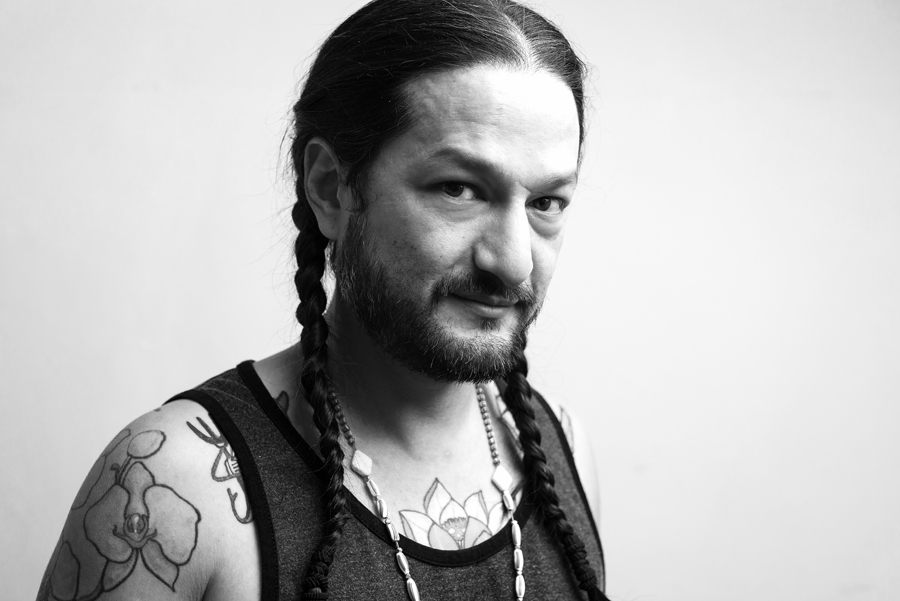
One thing you might be totally underrated on is the fact that you supported and built up underground artist like Chefket and Amewu.
Yeah, I supported a lot of people I believed in over years. In the end that’s what happened to Sido as well. I liked him in the beginning and wanted to support what he was doing and he ended up doing very well. Also because of the shows that we were playing, for me that’s what I know best – how to put together a live performance. So when Amewu and Chefket were coming up, we performed together a lot, I also did all the festivals with Chefket last summer. When I’m performing with somebody at a festival it’s really important for me to have the best show on this festival day, because the audience always just remembers a few things that happened on each day. In the hip hop sense it’s a little bit competitive. Chefket for example is a good live performer and when you get this mentality going in, it definitely helps to propel your career into a better place, when everyone remembers your show at the end of the day. The same thing is true for Amewu, it’s just a very different direction he is going. Everyone remembers his show, no matter who was there. It’s a lot about the „Each one, teach one“ idea of hip hop – to support artists of the younger generation. I also got a lot of help from older DJs when I was young. All of them opened doors for me, so it’s kinda fair to open up doors for other people that you believe in. There are so many talented people, but I think that doesn’t determine whether they are successful or not. I’ve also seen so many talented people just not getting their career together. In the end I think it’s a work ethic thing. Sido wasn’t like the most talented rapper when he started out, he just worked very hard. Other people where in a similar position as he was, but never reached their full potential.
Is there somebody else under your wings right now? Somebody who might be the next big thing?
I just did the musical direction for Suff Daddy for his tour. He will be here in Vienna in the middle of November I think. I put the band together and I helped them to set up the rehearsals and their live show. TrommelTobi, who did a lot of stuff with Amewu and Yarah Bravo, will play the drums and Hendrik from The Ruffcats is playing the keys. It’s a really professional group of musicians and a very interesting project so I’m really looking forward to seeing how it will work live. Sadly I may not see it, because I will be in California, but you guys will have to tell me how it was. It will be a great show, I promise!
How did the idea of this project come up? How did you find the musicians and put them together?
Suff Daddy actually asked me to help him, it was his idea to go on tour with live musicians and he knew that I’m quite good at organizing something like that. For me it was a favor to him, I’ve been a fan of his music for a pretty long time. Just a few weeks before he asked me, I already thought about working more in the musical direction without being on stage, so I was actually pretty lucky he came up with this idea. I know a lot of musicians from different projects in Berlin and we also have our own event called the „Turntable Tutorial“, where we have a lot of guests to jam with us and I met a lot of people there. And the music scene in Berlin isn’t that big, everybody knows each other. I worked with Tobi on totally different projects, so he was the drummer I thought of first.
„The Path“ is your first solo album after a lot of collaborations and other projects. Why did it take such a long time?
I think I’ve just been working with so many other people on their career that I didn’t really think about what I wanted to do. (laughs) But now it’s starting. I think I learned enough at my other jobs and now I finally trust myself doing a whole album alone. I already played it at the Beatgeeks last week and it’s a nice feeling to play my own music and to not just DJ. I’ll be in California the whole month of November trying to spread my album there as well.
Does the artwork have any specific meaning for you?
It’s from C-Line. She’s an artist from Switzerland and my ex-girlfriend. We were together for two years. The two years when I made all the music, we spent together. She was often painting while I made my beats so there is a crossover between the art and the music. I’m really blessed she made the whole artwork for me. She also made the artwork for my upcoming EP with Chrisfader. We are all family, long lost relatives.
Ähnliche Posts
- "You have to challenge the society" // Jahson The Scientist Interview
Jahson The Scientist ist ein "Wordsman", der in seinen Ausdrucksformen keine Grenzen kennt. Er ist…
- Interview mit Tokimonsta
Auf Tokimonsta wurde man vor gar nicht langer Zeit nur als wirklich engagierter Hörer aufmerksam.…
- "I wanted to be a Black Panther or a rapper" // Busdriver Interview
People call me 'Driver'", mit diesen Worten gesellte sich das Indie-Idol der Untergrund-Szene L.A.'s auf den…
1/3 Instrumentals, 1/3 Underground-Deutschrap, 1/3 Emotrap, wo hoid jemand bissi rumschreit.


